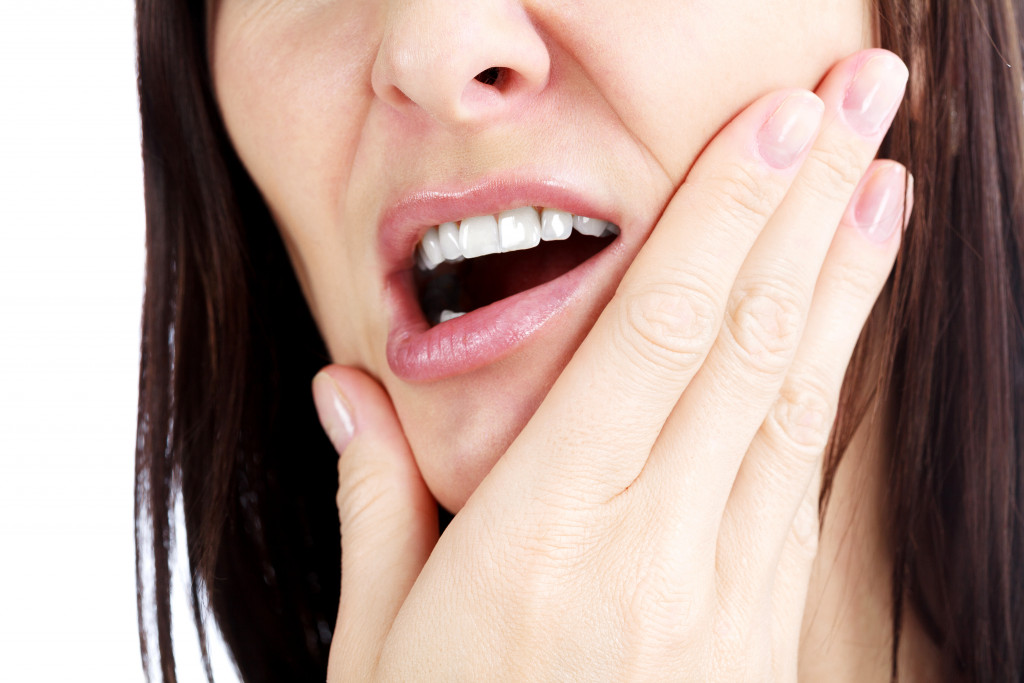• Bruxism (grinding or clenching teeth) is the most common cause of jaw pain, often due to stress and anxiety.
• TMJ disorder or TMD is caused by an imbalance in the Temporomandibular Joints (TMJs) and can lead to localized or spread-out pain.
• Arthritis, especially osteoarthritis in older adults, can cause chronic jaw pain if left untreated.
• Infections like abscesses may require medical attention and antibiotics to prevent their spread into other areas near the jaw.
• Visiting the dentist regularly and practicing healthy habits such as avoiding caffeinated drinks, exercising, and using relaxation techniques before bed can help prevent jaw pain.
Jaw pain can be a sign of many different issues. Therefore, it is essential to know the root cause to treat the discomfort properly. Knowing why can also help you treat it when you experience it. Jaw pain can be problematic, but it can be dealt with with the proper knowledge.
Four Reasons For Jaw Pain
There are various reasons for jaw pain. But some are more common than others. Here are four common reasons behind jaw pain, which will help you determine what could be causing your discomfort and how best to proceed.
Grinding or Clenching Teeth (Bruxism)
The most common cause of jaw pain is bruxism, which is excessive grinding or clenching of teeth during sleep. This is often caused by stress and anxiety but can also be due to a misaligned bite or crooked teeth.
The resulting pain can be localized or spread across the face, neck, and shoulders. You may also experience headaches and ringing in your ears due to bruxism-related jaw pain. To find relief from bruxism-related jaw pain, you should consider seeing an orthodontist for treatment options such as braces or Invisalign. Regular dental checkups are also crucial for identifying the signs of bruxism early on so that it can be treated promptly and effectively.
TMJ Disorder
Another common cause of jaw pain is TMJ disorder (also known as TMD), caused by an imbalance in the Temporomandibular Joints (TMJs). These joints connect your lower jawbone to your skull and allow for proper movement when chewing, talking, etc., so any issue with them can lead to significant discomfort in the area.
TMJ disorder symptoms include difficulty opening the mouth wide, clicking noises while moving the mouth, soreness around the common area, and limited range of motion with opening/closing the mouth. Treatment methods vary depending on severity; however, physical therapy exercises have been proven effective in helping alleviate symptoms associated with TMJ disorder.
Arthritis
Arthritis—the inflammation of one or more joints—can also lead to chronic jaw pain if left untreated. Osteoarthritis is especially common among older adults because it occurs when cartilage wears down over time.
However, rheumatoid arthritis (which affects both young and old alike) can also affect your jaw joint due to its autoimmune nature. While there is no cure for arthritis-related jaw pain, lifestyle changes such as modifying diets and exercising regularly may significantly reduce symptoms. In addition, nonsteroidal anti-inflammatory drugs may be prescribed in more severe cases to help quickly manage symptoms.
Infections
Finally, infections around the jaw area can also cause significant discomfort and should not be ignored if they occur persistently over time. Infections such as abscesses (pockets of pus caused by bacterial buildup) may require medical attention.
Antibiotics may need to be prescribed to clear up these infections before they spread further into other areas like sinuses or ears. If you notice signs of infection near your jaw area, such as redness/swelling and fever/chills, along with persistent pain in that region, then it’s best to consult a medical professional immediately for proper diagnosis and treatment plan options before it gets worse!
Tips to Prevent Jaw Pain
If you don’t want to experience jaw pain, you can do a few things to prevent it. Here are some of them.
Visit Your Dentist
Jaw pain can is related to many oral problems, and most of these problems can be fixed by your dentist. General dentistry covers many things and includes treatments such as checkups, cleanings, crowns, bridges, teeth whitening, and more. So it’s crucial to stay on top of your dental health and visit your dentist regularly.
Practice Good Habits
Many people suffer from jaw pain from grinding or clenching their teeth during sleep. To prevent this, practicing healthy habits such as avoiding caffeinated drinks, exercising, and using relaxation techniques before bed is essential.
Also, make sure to use a pillow that supports your neck while sleeping so that you won’t end up grinding or clenching your teeth.
Maintain A Balanced Diet
Eating too many sugary and processed foods can lead to dental problems, such as tooth decay and cavities. A balanced diet with plenty of fruits and veggies will keep your teeth healthy and reduce the risk of jaw pain.
In addition, make sure to drink enough water throughout the day as this helps flush out bacteria from the mouth.
Various issues can cause jaw pain, so it’s essential to know when and why it occurs. Following the tips above, you can take proactive steps to prevent and manage jaw pain.
If your discomfort persists or worsens, it’s best to consult a medical professional for accurate diagnosis and treatment options as soon as possible.

